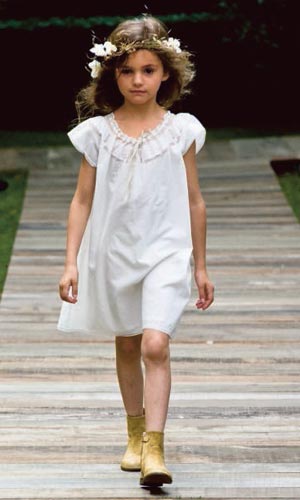
"If the 20th century was the century of the population explosion, the 21st century is looking like the century of the fertility implosion," political and cultural commentator David Brooks wrote in a March opinion piece for the New York Times.
"Already, nearly half of the world's population lives in countries with birth rates below the replacement level. According to the Census Bureau, the total increase in global manpower between 2010 and 2030 will be just half the increase we experienced in the two decades that just ended," he added.
 |
This has, inevitably, led to a decline in the market.
But Vallat, on the contrary, sees the positive side of the phenomenon, at least regarding luxury apparel for children.
"When you have only one or two kids, you would indulge them so badly that you would be more generous with their daily expenses," he said.
A survey conducted in January by Albatross Global Solutions, a Hong Kong-headquartered marketing services provider, supported Vallat's point of view. It found that 60 percent of the 900 respondents said they would spend more than 3,000 yuan every month to dress their children.
Generous Chinese parents have, unsurprisingly, attracted attention from other luxury houses to the market. Familiar names in the country such as Burberry, Gucci and Dior have all introduced collections under such names as "Baby Dior" or "Armani Junior" in recent years.
Despite the lack of a breakdown of sales in the market, the growing number of luxury children's clothes stores has proved to be a lucrative business.
Vallat regards the presence of these luxury brands as a boon for small companies such as Bonpoint.
"These brands have helped to create a market, showing consumers a new choice for their kids, which would be helpful for companies with little advertising budget like us," he said. "But as much as it sounds not so good, we are the only pure player working like a couture brand in the industry, rather than just making mini-versions of adults' attire."
Following the fashion calendar of most high-end luxury brands, Bonpoint provides three seasons of clothing every year (spring/summer, autumn/winter and a Christmas special) with more than 300 collections, each with a specially tailored size and cut for different age groups.
Vallat admits that having a store next to women's luxury brands is good for business.
Bonpoint now has more than 110 stores worldwide, most of which are located in prime luxury-shopping streets in cities including Paris, New York and London. The company plans to open six to eight new stores a year, three of which will be in China.
"We want to remain selective and primarily improve what we have first," said Vallat. Part of that drive involves store decoration revamps every two weeks in all Bonpoint stores around the world.
The tradition started with the birth of the brand. The window displays at Bonpoint have become as famous as its floral-patterned cotton dresses, if not more so. In the 1970s, most shops in Paris simply displayed their clothes by the window. Bonpoint's designers need to make their window display as imaginative and magical as they hope their products sell through storytelling. Store themes have varied from fairy tales such as Alice in Wonderland to science fiction featuring robots, a strategy Vallat believes will be especially helpful in China to attract new customers and enhance brand awareness.
"Three or four years ago, luxury for the Chinese was a way of expressing a successful life but now the Chinese are very close to the tastes of people in Japan or France, caring more about quality, service and store setting," said Vallat.
"It will lead the industry to a new stage, ideally a positive stage for companies such as Bonpoint," he said.
xujunqian@chinadaily.com.cn